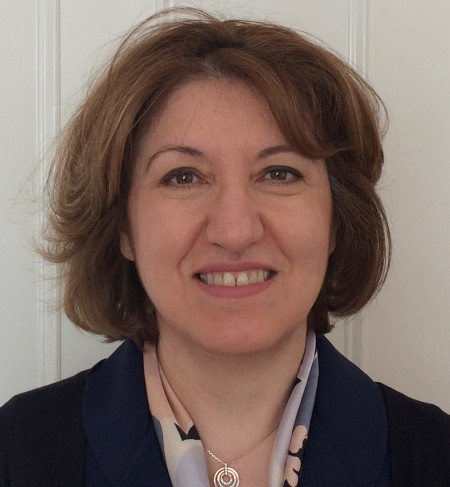
Dr Sotiria Psoma
Snr. Lecturer In Electronic Engineering, Bionanotechnology
Biography
Professional biography
Dr Sotiria Psoma received her MSc and PhD from the Institute of BioScience and Technology of Cranfield University. Her MSc by Research was carried out in the field of biosensors and nanotechnology. The main focus of her doctoral thesis was the development of optical biosensors for clinical and environmental applications using enzymatic reactions and immobilisation techniques, fluorescence spectroscopy, bioelectronics and fibre optics. Sotiria has a first degree in Electronic Engineering from the Piraeus University of Applied Science in Athens, Greece.
For over 25 years, Dr Psoma has gained substantial experience in the development of optical biosensors, micro-nano-biosensors and bioengineering applications for healthcare. Before joining the Open University in September 2018, Dr Psoma worked as an Experienced Research Scientist at Cambridge Display Technology Limited, in the field of biosensors/sensors. During her career she participated in national and EU research projects with international collaborations and she held a number of senior research and teaching positions. She worked in the Engineering Department of the Rutherford Appleton Laboratory (Marie Curie Fellow), the Gray Cancer Research Institute at Mount Vernon Hospital/Northwood, the Department of Pharmaceutical Studies at the University of Nottingham and the University of Western Macedonia in Greece.
Between 2011 and 2017, Dr Psoma held the honorary post of Visiting Professor in Nanotechnology/BioMEMS at EPFL (École Polytechnique Fédérale de Lausanne), School of Engineering, Institute of Microengineering in Switzerland and she closely collaborated with Professor Nico de Rooij in SAMLAB.
Sotiria is a member of the international Editorial Advisory Board of the Open Access Books ToolKit (OAPEN Foundation, Netherlands and Springer Nature Publishing).
Since 2021, Dr Psoma holds the position of Visiting Academic at the School of Aerospace, Transport and Manufacturing of Cranfield University.
Research interests
The research interests of Dr Psoma are focused on harnessing the power of engineering and nanotechnology for developing low-cost, reliable, highly stable optical biosensors for healthcare applications. This is part of a multidisciplinary research effort aimed at exploring and developing aptamers, biocompatible materials and polymers, novel immobilisation techniques, microfluidics and bioelectronics for the construction of smart micro-biosensors towards personalised medicine.
The five major strands of Dr Psoma’s research portfolio are:
1. Basic understanding of the interface of biological materials with transducers in biosensor technology and immobilisation techniques
2. Aptamer technology in combination with Nanotechnology for biosensor applications
3. Development of 3D models with integrated fluidics and OLED/OPD electronics
4. Utilisation of fluorescence spectroscopy in optical biosensor field
5. Continuous monitoring and multi-analyte portable devices for diabetes management and healthcare applications
6. Computational analysis and design of microchambers and microfluidics for biosensor applications
7. Energy harvesting from the human body for self-powered biosensors
Sotiria is the founder of the European Wearables and Biosensing Network with aim to foster innovation, collaboration and synergy across diverse fields. The Network mission is to bring together diverse stakeholders including academic research institutions, RTOs, healthcare profesionals, patient associations, industry and policy makers, empowering them to shape the future of wearable and biosensing technology. (https://www5.open.ac.uk/stem/engineering-and-innovation/european-wearables-and-biosensing-network)
Dr Psoma welcomes applications from potential PhD students in optical biosensor technology, aptamer technology in combination with fluorescence spectroscopy, OLED/OPD technology for portable devices and utilisation of nanomaterials in biosensor healthcare applications, diabetes management and personalised medicine.
Keywords
Biosensors; aptamers; fluorescence; nanotechnology; micro/nanofluidics; bioelectronics; wearable biosensors; contact lens based biosensors, human energy harvesting; personalised diagnostics.
Teaching interests
Engineering, Bioelectronics, Biosensors and Nanotechnology:
- Presentation chair of the module T212 Electronics: Sensing, logic and actuation, which illustrates electronic/electrical engineering at device level and it started in October 2017;
- Team member of the module production T366 Nanoscale Engineering, which will offer students the opportunity to study topics related to nanotechnology in engineering and their applications. Lead author of T366 Book 3.
- Team member of the module T312 Electronics: Signal processing, control and communications.
- T176 Engineering / Residential School: Professions, practice and skills 1 (Tutor Activity)
- T276 Engineering / Resedential School: Professions, practice and skills 2 (Project Tutor)
Publications
Journal Article
A 3D-Printed Piezoelectric Microdevice for Human Energy Harvesting for Wearable Biosensors (2024)
A hybrid piezoelectric and electrostatic energy harvester for scavenging arterial pulsations (2023)
Wearable Insulin Biosensors for Diabetes Management: Advances and Challenges (2023)
Recent Advances in Energy Harvesting from the Human Body for Biomedical Applications (2022)
A novel enzyme entrapment in SU-8 microfabricated films for glucose micro-biosensors (2010)
Utilisation of JSR and BCB resists for the construction of gray scale microstructures (2009)
Influence of photo-initiator concentration on residual mechanical stress in SU-8 thin films (2006)
SU-8 micro-biosensor based on Mach-Zehnder interferometer (2005)
Comparative assessment of different sacrificial materials for releasing SU-8 structures (2005)
Presentation / Conference
A Hybrid Piezoelectric and Reverse Electrowetting Energy Harvester for Wearable Biosensors (2024)
The potential role of wearable insulin biosensors in diabetes management (2024)
A 3D printed wearable piezoelectric platform for energy harvesting from artery pulsation (2023)
A hybrid piezoelectric and electrostatic energy harvester for scavenging arterial pulsations (2022)
An aptamer-based fluorescent biosensor for insulin detection. (2019)
Utilisation of microbiosensors for monitoring phenols in whisky fermentation process (2019)